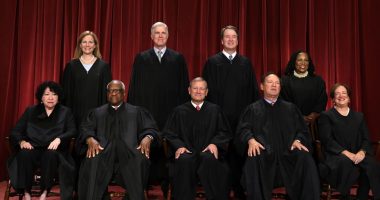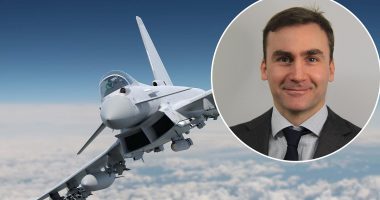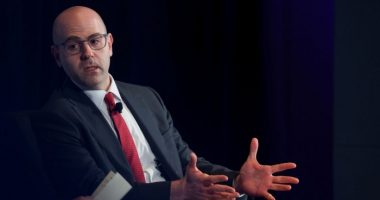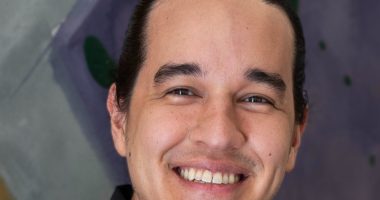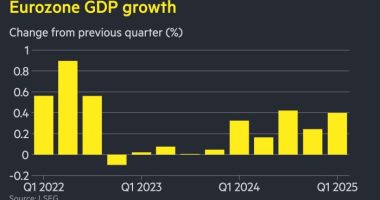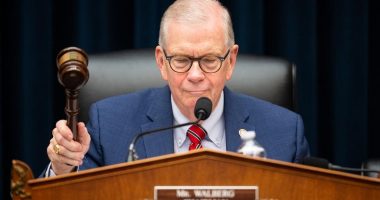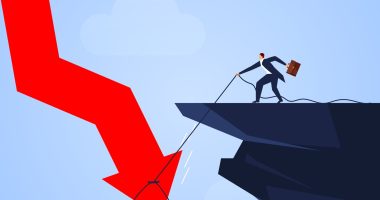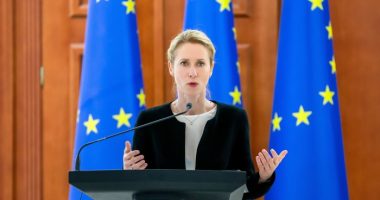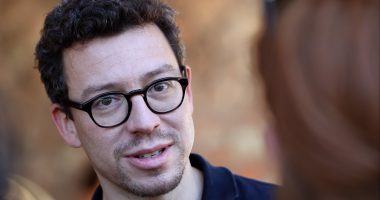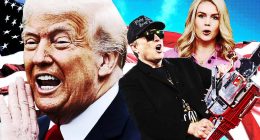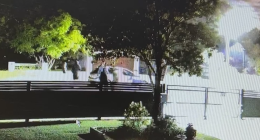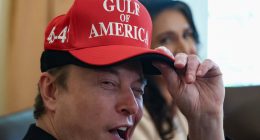Share this @internewscast.com
Vladimir Putin is cruising to victory in Russia’s presidential election, cementing his rule for another six years amid his invasion of Ukraine and brutal suppression of dissent.
Early results on Sunday showed the Russian president on track to be re-elected with a record 88 per cent of the vote and turnout of more than 70 per cent, according to the Russian electoral commission with 25 per cent of returns counted.
The result was a foregone conclusion after the Kremlin outlawed all criticism of Putin or the war and blocked any opposition candidates from running.
As results came in, Volodymyr Zelensky, president of Ukraine, wrote on X: “The Russian dictator is simulating another election. Everyone in the world understands that this figure . . . has simply become addicted to power and is doing everything he can to rule forever. . . . There is no legitimacy in this imitation of elections and there cannot be.”
President of the European Council Charles Michel wrote: “Would like to congratulate Vladimir Putin on his landslide victory in the elections starting today. No opposition. No freedom. No choice.”
However, Dmitri Medvedev, the former Russian president, said: “Congratulations to all Russia’s enemies on Vladimir Putin’s brilliant victory in the election of the President of the Russian Federation!”
The longest-serving ruler since Joseph Stalin, Putin has solidified his grip on power despite western efforts to impose harsh economic sanctions on Moscow for the invasion of Ukraine. Russia’s army has regained the initiative against outmanned and outgunned Ukrainian forces while the Russian economy has rebounded thanks to a wartime surge in defence spending and economic lifelines from countries such as China.

Putin’s repression of domestic dissent since the invasion has left him with no challengers after Alexei Navalny, his most prominent opponent, died in a remote Arctic prison colony last month. Navalny’s family and supporters have been forced into exile and have blamed Putin for his death, an allegation the Kremlin denies.
From exile or prison, opposition leaders had urged supporters to go to the polls en masse at noon on Sunday in Navalny’s memory and vote against Putin. Hundreds of people followed the call, according to footage posted on social media.
“My wife, my friend and I came to the polling station around twelve,” said Danil, a corporate lawyer who lives in a northern Moscow neighbourhood. He said that a “visible line” of people of all ages started forming at noon.
“I expected problems, that the authorities would close the station at noon. But except for the line, the was nothing extraordinary,” Danil said.

Vera, a young woman in Moscow, said she came to vote at midday to show her opposition to Putin, and “that I do not support everything that is happening in the country”.
Abroad, even longer lines formed in cities with large Russian émigré populations including Dubai, Almaty and Berlin, where Navalny’s widow Yulia Navalnaya queued to vote.
One of the longest lines was recorded in the Armenian capital, Yerevan, which is home to one of the largest Russian communities.
Elena, a podcast editor, said she travelled from neighbouring Georgia, which does not have a Russian embassy, with more than a dozen friends. “I understand that my vote won’t change anything, but I think it’s an important event to observe and to see how many of us are there,” she said.
In London, the queue outside the Russian embassy that formed towards noon was nearly 2km long. Alina, 25, a student from the Siberian city of Kogalym, said she came to the polling station because “we have very few rights in our country, and we must exercise the ones we have left”.
Russian police detained more than 65 people on Sunday including for writing “No to war!” on a ballot, wearing a T-shirt with Navalny’s name on it, or trying to slip a photo of the late opposition leader into the ballot box, according to independent rights monitor OVD-Info.
In the first two days of the election, dozens were arrested across Russia for setting voting booths on fire, or throwing Molotov cocktails at polling stations.
Some local officials attempted to explain away the protests. Authorities in Novosibirsk, Siberia’s largest city, claimed the noon queues had been caused by repair works.
Independent election monitor Golos, whose co-chair Grigory Melkonyants was jailed last year, said authorities had also coerced public sector employees into voting early or pushed them to vote online.
The three lawmakers who were allowed on the ballot alongside Putin support the war and have avoided criticising the Russian president.
Putin has appeared increasingly confident of a Russian victory after a Ukrainian counteroffensive last year failed and the US Congress has yet to approve fresh aid for Kyiv.
Russia’s arms industry is working in round-the-clock shifts, the army has replenished its troops with hundreds of thousands of men, and countries including Iran and North Korea have supplied Moscow with additional munitions.
The partial annexations of four Ukrainian regions in 2022 and incremental frontline gains since then, however, have cost Russia more than 350,000 in casualties, as well as significant equipment losses and damage from Ukrainian strikes behind the front lines.
Kyiv stepped up a series of drone attacks mostly targeting cities near the border and fuel infrastructure this week, which Putin said was an attempt to disrupt the vote. Three people died during attacks over the weekend in Belgorod region, which has borne the worst of the spillover from Ukraine, according to governor Vyacheslav Gladkov.
Additional reporting by Daria Mosolova in London
